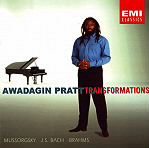This is a seductive program. The idea of transformation is treated very differently by the chosen composers, and could lead to a very stimulating listening experience. But Awadagin Pratt’s slow and ceremonious playing doesn’t do full justice to any of the three works, certainly not to Mussorgsky’s peculiar mix of intimate expression and grandiose climax in Pictures at an Exhibition. Phrases are carefully built–too carefully. With such a uniformly cautious pace and limited dynamic range, these variegated tableaux end up lacking contrast, drive, and animation. Even the savagery of “Baba-Yaga” receives the same low-energy treatment as the meditative promenades. The high medium-oriented recording may explain some of the dullness of the playing, but not all of it. Compared to performances as gripping (and different in the extremes) as those by Sviatoslav Richter, Ivo Pogorelich, Benno Moiseiwitsch, Maria Yudina, or Vladimir Horowitz, this newcomer has very little to offer. Pratt’s effective transcription of Bach’s monumental Passacaglia and Fugue in C minor for organ works better, despite some disturbing unevenness of tempo. In the Brahms Handel-Variations, the competition is as tough and perilous as with Pictures. The woody sonority of the Bösendorfer Imperial perfectly suits the character of the music, but once again Pratt misses the point. A few poetic moments apart, his square, stiff, heavy performance seems constantly in search of a more flowing and natural approach. Egon Petri, Julius Katchen, Benno Moiseiwitsch (again), Stephen Kovacevich, Yves Nat, and Leon Fleisher, to name just a few, have done a better job with this piece.
































